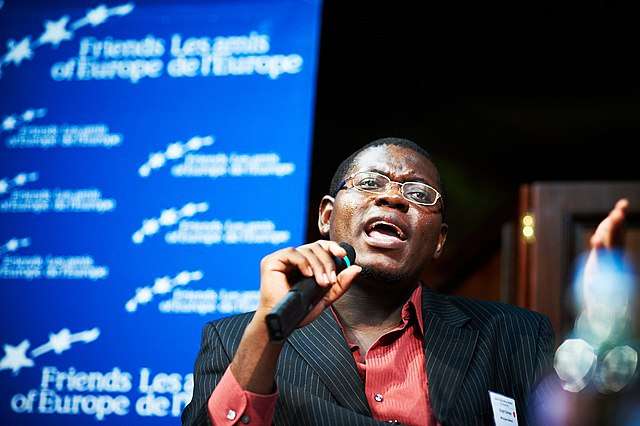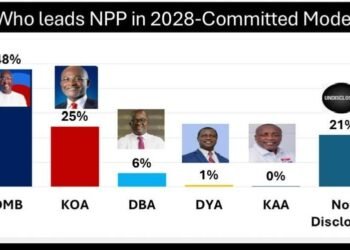Bright Simons, the Honorary Vice President of IMANI Centre for Policy and Education, has sparked an important debate with his recent remarks on how legal matters are approached in Ghana.
In a public statement, Bright Simons criticized the way law is discussed in the country, expressing his bemusement at the assumption that mastery of legal jargon and concepts could lead to “ultimate truth” in public matters. His comments delve into the intersection of law, politics, sociology, and public perception, calling for a broader perspective on national issues, particularly with regard to the Supreme Court of Ghana.
He pointed out that even when numerous lawyers debate a contentious issue, non-lawyers are urged to consider these exchanges as profound contributions to the nation’s understanding.
“No, it is not the pompous jargon and the echo chamber style,” Bright Simons quipped, adding that the real issue is the expectation that deeper legal knowledge and skill will naturally lead to societal truth.
“Here is the fact: the Law is NOT math. Greater knowledge and skill do not lead one to ultimate truth in any social or political matter.
“Watch and listen carefully and you would see that in any important issue lawyers are often just as divided as non-lawyers based on their political biases and social allegiances.”
Bright Simons, Honorary Vice President of IMANI Centre for Policy and Education
Bright Simons underscored that Ghana’s national discussions, particularly on legal matters, should not be dominated solely by legal perspectives. He called for issues of public importance to be examined from multiple angles, including politics, sociology, civics, and policy.
This, Bright Simons believes, is crucial for guiding a society toward what he calls “the most sensible and socially beneficial outcome.” In his view, relying exclusively on legal expertise does not guarantee forward-thinking solutions to national problems.
He highlighted the importance of drawing on a broader base of knowledge, as law itself is often the product of centuries of accumulated wisdom and social learning.
“In places where Ghana’s law was borrowed—Europe, that is—legal frameworks such as Common Law and Canon Law didn’t emerge from divine decrees.
“Instead, they evolved over time, shaped by the collective learning of the people. It is important to recognize that this kind of evolution cannot happen solely within the confines of legal thought.”
Bright Simons, Honorary Vice President of IMANI Centre for Policy and Education
Decline in Confidence in the Supreme Court

Bright Simons also expressed concerns about the declining public confidence in Ghana’s Supreme Court. Having observed public affairs for over two decades, he stated that he has never seen such a low level of trust in the judiciary.
This decline, he argued, cannot simply be analyzed through the lens of legal texts and court decisions.
According to Simons, those who argue that the discontent surrounding the Supreme Court is merely the result of partisan politics are adopting a narrow, “pseudo-mathematical” approach to the issue.
He emphasized that respect for institutions like the Supreme Court cannot be derived solely from legal texts, just as mathematical solutions are derived from equations.
“We cannot extract respect from some dry legal text for an institution like we can factor a root from a polynomial,” Bright Simons said.
He insists that public trust in the judiciary, and specifically the Supreme Court, must be viewed from multiple dimensions.
“Our assessment of the quality of the Supreme Court must reflect various perspectives of our national life: the political, the sociological, the policy-dimension, and the historical.”
Bright Simons, Honorary Vice President of IMANI Centre for Policy and Education
Holistic Institutional Assessment
Bright Simons argued that an institution like the Supreme Court needs to engage with the broader political and social context to maintain its legitimacy.
He emphasized that failure to do so would lead to a shallow understanding of the Court’s role and actions. Institutions that disregard the social and political realities in which they operate are at risk of losing public confidence, he warned.
“The simple truth, dear friends, is that if nations were mere mathematical charts, the mathematicians would be ruling the world,” Simons remarked, in a pointed criticism of the overly technical focus that sometimes characterizes discussions about the judiciary.
For Bright Simons, the assessment of the Supreme Court must include reflections on its social role, historical context, and its ability to respond to the political and cultural needs of the nation.
Bright Simons’ observations provide a thought-provoking critique of the way law is perceived and discussed in Ghana. His call for a more nuanced, multi-dimensional approach to public matters, especially concerning the Supreme Court, challenges the dominance of legal discourse in shaping public opinion.
READ ALSO: Keir Starmer Faces Mounting Pressure Over Reparations Stance























